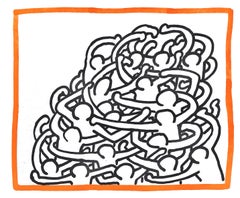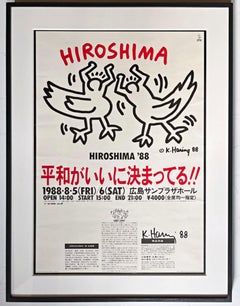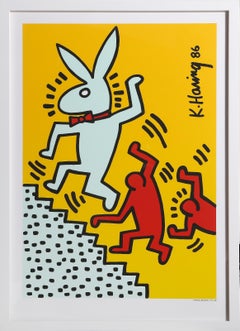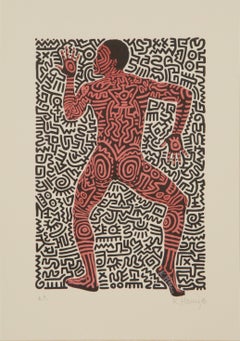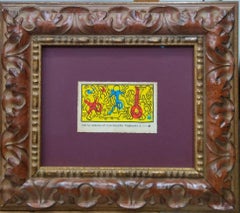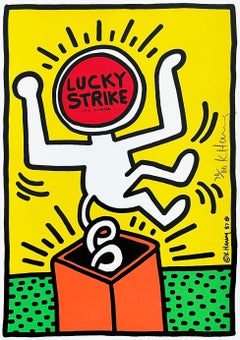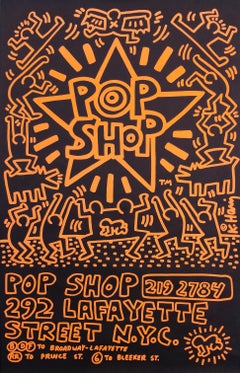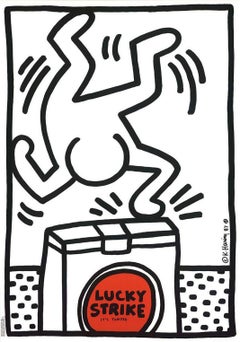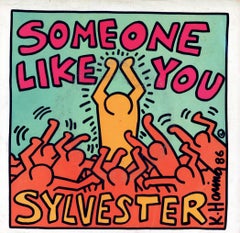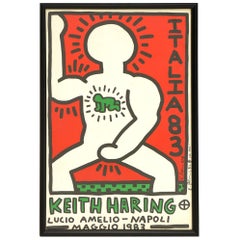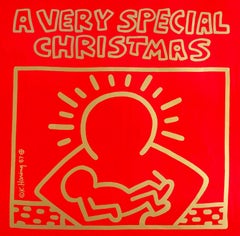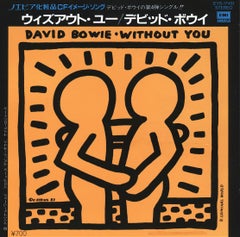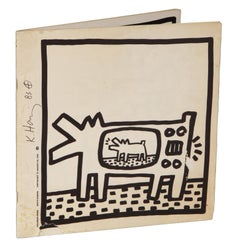Keith Haring
Keith Haring began experimenting with his bold, graphic lines and cartoon-inspired figures on the walls of New York City subway stations in the early 1980s. He called them his “laboratory,” places to develop a radical new aesthetic based on an ideology of creating truly democratic public art.
Haring’s paintings, prints and murals address the universal themes of death, love and sex, as well as contemporary issues he experienced personally, like the crack-cocaine and AIDS epidemics. They derive much of their impact from the powerful contrast between these serious subjects and the joyful, vibrant pictographic language he uses to express them, full of dancing figures, babies, barking dogs, hearts and rhythmic lines, as well as references to pop culture.
To make his art even more accessible, in 1986, Haring opened the Pop Shop in Soho. In a foreshadowing of today’s intermingling of art and fashion, the shop sold merchandise and novelty items featuring imagery by Haring and contemporaries like Kenny Scharf and Jean-Michel Basquiat. While his works sometimes included text, for the most part, he chose to communicate through drawing.
“Drawing is still basically the same as it has been since prehistoric times,” Haring once declared. “It lives through magic.”
Find Keith Haring art on 1stDibs today.
| Average Sold Price |
| $1,008 |
| Styles |
| Materials |
| Related Artists |
1990s Pop Art Keith Haring
Lithograph
1980s Pop Art Keith Haring
Lithograph, Offset
1990s Pop Art Keith Haring
Screen
21st Century and Contemporary Keith Haring
Paper, Etching
1980s Contemporary Keith Haring
Mixed Media
1980s Pop Art Keith Haring
Screen
1980s Pop Art Keith Haring
Lithograph, Offset
1980s Pop Art Keith Haring
Permanent Marker
Popular Searches
Keith Haring Sale Prices
| Sold Date | Sold Price | Category | Medium | Creation Year | ||||||||||||||||||||||||||||||||||||||||||||||||||||||||||||||||||||||||||||||||||||||||||||||||
|
| $1,008 |
Average sold price of items in the past 12 months |
| $45-$9,000 |
| Sold price range of items in the past 12 months |
Artists Similar to Keith Haring
Keith Haring art for sale on 1stDibs.
- What was Keith Haring known for?1 Answer1stDibs ExpertAugust 8, 2024Keith Haring was known for his work as an artist. He began experimenting with his bold, graphic lines and cartoon-inspired figures on the walls of New York City subway stations in the early 1980s. He called these underground places his “laboratory” to develop a radical new aesthetic based on the ideology of creating truly democratic public art. Haring used paintings, prints and murals to address the universal themes of death, love and sex, as well as contemporary issues he experienced personally, like the crack-cocaine and AIDS epidemics. These works derive much of their impact from the powerful contrast between these serious subjects and the joyful, vibrant pictographic language he used to express them, full of dancing figures, babies, barking dogs, hearts and rhythmic lines, as well as references to pop culture. To make his art even more accessible, in 1986, Haring opened the Pop Shop in Soho. In a foreshadowing of today’s intermingling of art and fashion, the shop sold merchandise and novelty items featuring his imagery. Find a collection of Keith Haring art on 1stDibs.
- 1stDibs ExpertMarch 22, 2022Keith Haring became famous largely through people viewing the street art he created in subway stations and other locations in New York City. Throughout the 1980s, he was commissioned to produce art in dozens of cities all over the world and showed his works in solo and group exhibitions. A 1982 show at the Tony Shafrazi Gallery in Soho, New York City, earned rave reviews and greatly contributed to his fame. You'll find a selection of Keith Haring art on 1stDibs.
- Where is Keith Haring from?1 Answer1stDibs ExpertMarch 22, 2022Keith Haring is originally from Kutztown, Pennsylvania, although he was born in the nearby city of Reading, Pennsylvania, on May 4, 1958. In 1978, Haring moved to New York City. He continued to live there until he died on February 16, 1990. Find a selection of Keith Haring art on 1stDibs.
- Who is Keith Haring?1 Answer1stDibs ExpertMarch 22, 2022Keith Haring was a modern American artist and activist. He began as a street artist creating graffiti-inspired works throughout New York City’s subway system and would later produce public murals in cities all over the world. Haring’s paintings, prints and murals address the universal themes of death, love and sex, as well as contemporary issues he experienced personally, like the crack-cocaine and AIDS epidemics. In 1986, Haring opened a Pop Shop in Manhattan’s Soho neighborhood to sell merchandise bearing his bold, cartoon-inspired designs. On 1stDibs, find a variety of Keith Haring art.
- 1stDibs ExpertMarch 22, 2022The Keith Haring Foundation is a philanthropic organization founded by the artist Keith Haring in 1989. Its mission is to provide funding for nonprofit organizations who offer services and programs for children or conduct research or educational initiatives related to AIDS.
- Where did Keith Haring live?1 Answer1stDibs ExpertMarch 22, 2022For most of his life, Keith Haring lived in New York City and died there on February 16, 1990. He grew up in Kutztown, Pennsylvania, and briefly attended an art school in Pittsburgh, Pennsylvania. After he arrived in New York in 1978, he turned the city into a gallery space, creating murals in public areas like subway stations. On 1stDibs, shop a collection of Keith Haring art.
- Why is Keith Haring important?1 Answer1stDibs ExpertMarch 22, 2022Keith Haring is important primarily because his innovative work, which began as street art on the New York City subway, became widely known during the 1980s and influenced other artists working at the time. Haring was also an activist — his late-career prints and murals addressed contemporary issues he experienced personally, like the crack-cocaine and AIDS epidemics. Haring helped elevate graffiti art and was one of the first artists to begin placing his designs on merchandise sold to the general public through his Pop Shop in New York City. Shop a collection of Keith Haring art on 1stDibs.
- What inspired Keith Haring?1 Answer1stDibs ExpertMarch 22, 2022Keith Haring drew most of his inspiration from graffiti artists and got his start painting subway stations and other locations around New York City. In addition, artists such as Pierre Alechinsky, William Burroughs, Jean Dubuffet, Brion Gysin and Robert Henri influenced his work. On 1stDibs, shop a collection of Keith Haring art.
- 1stDibs ExpertFebruary 1, 2024Some facts about Keith Haring include that he began his career by creating street art in New York subway stations, which he referred to as his "laboratory." In 1986, Haring opened the Pop Shop in Manhattan’s Soho neighborhood and began selling merchandise and novelty items featuring imagery by himself and contemporaries like Kenny Scharf and Jean-Michel Basquiat. Also, the world's largest jigsaw puzzle features Haring's artwork and consists of 32,000 pieces. After his death, his estate formed the Keith Haring Foundation to raise awareness about AIDS and fund research into the autoimmune disease. On 1stDibs, explore a wide range of Keith Haring art.
- When was Keith Haring born?1 Answer1stDibs ExpertMarch 22, 2022Keith Haring was born on May 4, 1958, in Reading, Pennsylvania. After growing up in Kutztown, Pennsylvania, and briefly attending art school in Pittsburgh, Pennsylvania, he moved to New York City, where he made a name for himself creating street art on the subway system. Haring gained an even larger audience in the years that followed, producing public murals that were often commissioned and making art that was frequently informed by political and cultural issues. On 1stDibs, find a selection of Keith Haring art.
- How do I pronounce Keith Haring?1 Answer1stDibs ExpertMarch 22, 2022To pronounce Keith Haring, say "Keeth HEH-ring." Keith Haring was born on May 4, 1958, in Reading, Pennsylvania, and grew up in nearby Kutztown, Pennsylvania. You'll find a range of Keith Haring art on 1stDibs.
- What is Keith Haring famous for?1 Answer1stDibs ExpertMarch 22, 2022Keith Haring is famous for producing bold cartoon-style art. You may see his work printed on everything from home décor to coffee mugs to fashion accessories. He gained notoriety for street art in his early days as an artist. Later, Haring’s revered paintings, prints and murals would address the universal themes of death, love and sex, as well as contemporary issues he experienced personally, like the crack-cocaine and AIDS epidemics. On 1stDibs, find a collection of Keith Haring art.
- Where did Keith Haring work?1 Answer1stDibs ExpertMarch 22, 2022In his early days as an artist, Keith Haring worked primarily in New York City, where he created murals on walls and unused advertising boards along Manhattan’s subway system. Once his work gained popularity, he traveled to produce work in Australia, Europe and elsewhere. You'll find a collection of Keith Haring art on 1stDibs.
- 1stDibs ExpertMarch 25, 2024Keith Haring's art was about a variety of subjects. His paintings, prints and murals addressed themes of death, love and sex, as well as contemporary issues, like drug use and the AIDS epidemic. His work derives much of its impact from the powerful contrast between these serious subjects and the joyful, vibrant pictographic language he used to express them. Haring’s enduring work is full of dancing figures, babies, barking dogs, hearts and rhythmic lines, as well as references to pop culture. On 1stDibs, explore a collection of Keith Haring art.
- 1stDibs ExpertApril 16, 2024Keith Haring used a variety of materials. Over the course of his career, he produced works in markers, chalk, felt-tip pens, ink and acrylic paints. For his murals, he often preferred spray paint. Interestingly, the artist rarely made sketches for even his largest works, preferring to improvise during the creation process. Find a wide range of Keith Haring art on 1stDibs.
- 1stDibs ExpertMarch 15, 2024You can see Keith Haring art displayed in numerous museums and in some public spaces. New York City is home to many pieces, including at the Carmine Street Pool; in the Lesbian, Gay, Bisexual & Transgender Community Center; in Woodhull Hospital; at East 128th Street and the Harlem River Drive and in the collections of the Museum of Modern Art. To discover more locations in the U.S. and around the world, visit the official website of the Keith Haring Foundation. Shop a selection of Keith Haring art on 1stDibs.
- 1stDibs ExpertApril 5, 2022Keith Haring painted in New York City subways because he wanted his artwork to be accessible to the general public. He also produced works in other locations throughout the city. You can find a range of Keith Haring art on 1stDibs.
- 1stDibs ExpertApril 5, 2022What Keith Haring's figures mean depends on the lines near them. Curves show that a figure is in motion, while short straight lines represent sound. The figures themselves are usually meant to signify various roles in society. On 1stDibs, shop a selection of Keith Haring art.
- 1stDibs ExpertMarch 22, 2022The type of art that Keith Haring primarily did was drawing. He is most often associated with the Pop art movement. Initially, Haring was inspired by graffiti artists and began experimenting with his bold, graphic lines and cartoon-inspired figures on the walls of New York City subway stations in the early 1980s. After gaining recognition for his innovative street art, Haring was commissioned to create murals in cities all over the world. Shop a range of Keith Haring art on 1stDibs.
- 1stDibs ExpertJune 6, 2024The style of Keith Haring's art is Pop art. When creating his paintings and murals, he drew inspiration from cartoons and used this playful approach to provide commentary on the issues of his time, such as the crack and AIDS epidemics, and the universal themes of death, love and sex. Since he got his start experimenting with his bold, graphic lines and figures on the walls of New York City subway stations, many people have also referred to him as a street artist. Shop a range of Keith Haring art on 1stDibs.
- 1stDibs ExpertMarch 22, 2022You can see Keith Haring art at many museums in North America, Europe and Asia. In New York City, some of his pieces hang in the Museum of Modern Art and the Museum of the City of New York. Some of his murals remain in the city, as well. A map of all of the existing murals is available on the Keith Haring Foundation's website. Shop a collection of Keith Haring art on 1stDibs.
- 1stDibs ExpertMarch 22, 2022Keith Haring went to school briefly at the Ivy School of Art in Pittsburgh, Pennsylvania. In 1978, he moved to New York City, where he attended the School of Visual Arts. Other famous alumni from the school include Sarah Sze, James Jean and Joe Sinnott. Find a selection of Keith Haring art on 1stDibs.
